Do you want to learn about the MOST Common Biting Insects in North Dakota?
Finding a Guide to the MOST Common Biting Insects in North Dakota was not as easy as I thought. According to the Insect Identification Database of North Dakota, there are over 1000 insects in North Dakota and some of the guides were too broad, others were irrelevant, and some didn’t provide enough information.
That’s why I created a list of the 10 MOST Common Biting Insects in North Dakota.
This ultimate guide will not only give you the most common biting insects in North Dakota but also important and interesting facts about them.
Read THIS Before Identifying Common Biting Insects in North Dakota
Knowing what types of biting insects are found in North Dakota is incredibly helpful for gardening, lawn care, home protection, and so much more.
Some biting insects are dangerous and destructive while others are so beneficial in nature. Therefore, their influence on human health, agricultural resources, and ecology is an aspect that we cannot take for granted.
10 MOST Common Biting Insects in North Dakota
#1. Cockroaches
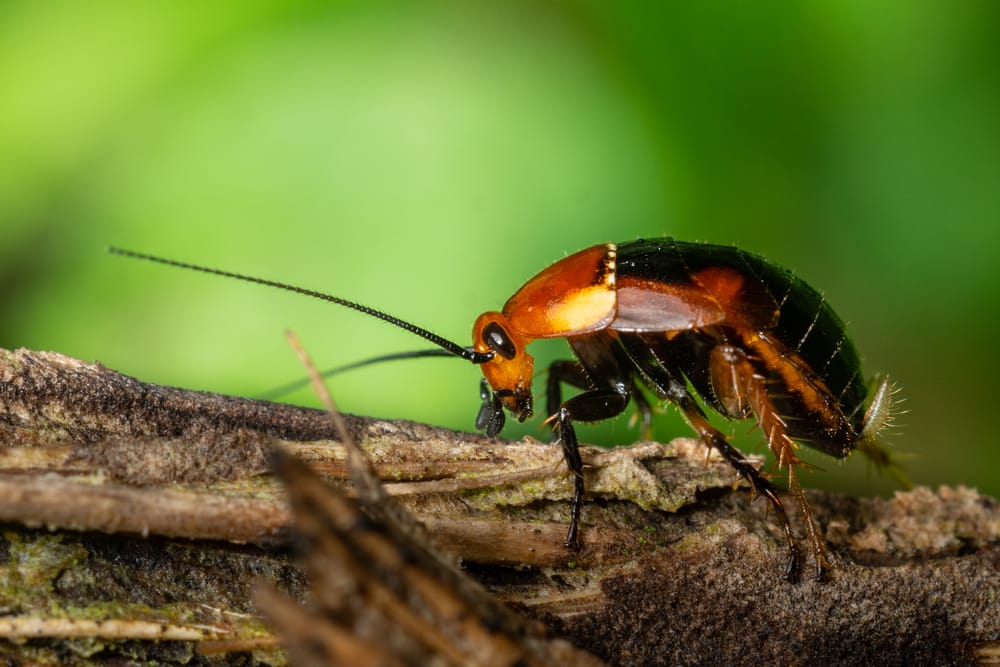
Believe it or not, Cockroaches are some of the most common biting insects in North Dakota!
Cockroaches that you can find in North Dakota include the American cockroach (Periplaneta americana), Oriental cockroach (Blatta orientalis), and German cockroach (Blattella germanica), and commonly these biting insects are referred to are roaches!
They are resilient biting insects that can survive a week without their head, survive extreme heat and cold, and can stay without breathing for 40 minutes.
Not only that but it has been reported that they can go up to 12 weeks without food and water.

Identifying characteristics and facts
- They are small and can easily hide in small openings, crevices, and cracks.
- Cockroaches have wings, all have flattened-oval bodies and long antennae.
- They feed on different food materials such as sugar and food containing proteins.
- They can run very fast – up to 3 miles per hour.
- They breed fast and can produce up to 30,000 cockroaches in a year.
Are Cockroaches Dangerous?
Yes, cockroaches have been found to spread some diseases when they bite. According to Better Health Channel, they can cause diseases like gastroenteritis and salmonella.
Roaches feed on anything including plants and meat, whether alive or dead. Their bite can also cause some swellings, irritations, and other minor illnesses.
If you identify a cockroach in North Dakota, please make sure to take the necessary control measures to prevent its spread.
#2. Bedbugs

Cimex lectularius is the most common bedbug that you can find in North Dakota. It is also one of the biting insects you do not want to come across.
Not only that, but bedbugs may be the most feared insect in both North Dakota and for travelers in hotels and Airbnb.
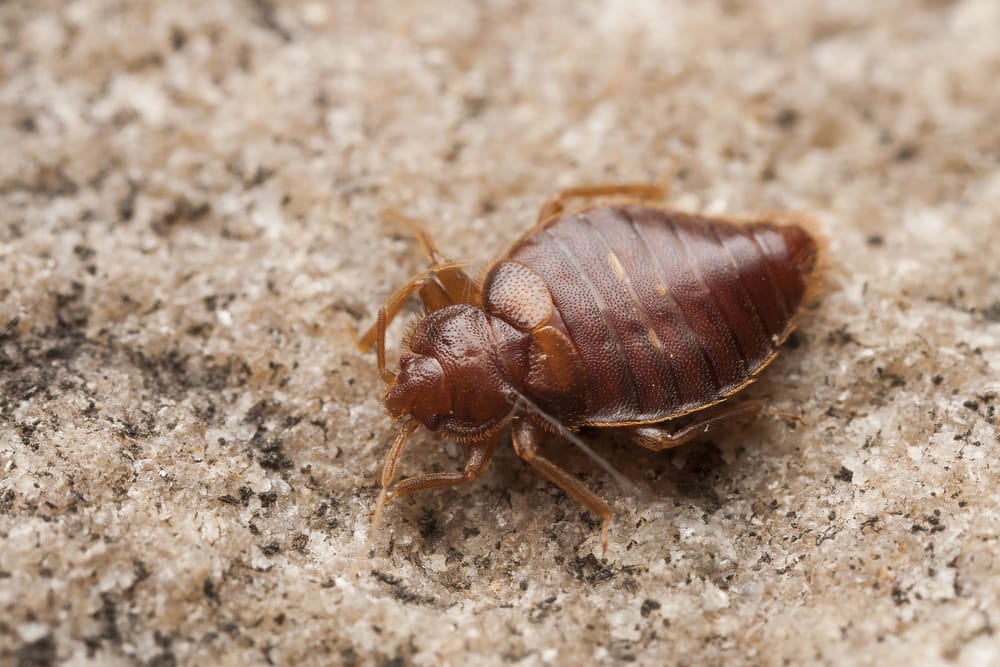
Identifying characteristics and facts
- Flat and oval-shaped bodies and striped body appearance due to colored body hair.
- Reddish brown and small in size (between 1– 6 mm in length), has no wings, and have two large antennae.
- They have large mandibles or mouthparts.
- Can live for months without food, they live around where people sleep, and they feed on people’s and animals’ blood.
Are Bedbugs Dangerous?
According to the Center for Disease Control and Prevention, there is no known disease that bedbugs have been found to spread.
However, you don’t want to imagine the bedbug experience if you have never had one! They are totally irritating and will make you lose sleep throughout the night due to their itching and irritating annoyance.
And worst of all bedbug bites can leave some physical bite marks all over your body and even make you have to destroy your clothes and furniture.
#3. Mosquitoes

The most common mosquitoes in North Dakota are the malaria mosquitoes – Anopheles quadrimaculatus. Because of how pesky they are, you most likely recognize them as the most common insect in North Dakota!
Did you know that North Dakota has over 60 species of mosquitoes and every year more mosquito-borne diseases are appearing.
If you want to protect yourself from mosquitoes then make sure to use 15 BEST Mosquitoes Repellent Plants, especially from May through October.

Identifying Characteristics and Facts
- Slender and segmented bodies with wings have long proboscis or biting organs.
- Elongated fragile-looking legs and feathery antenna.
- They feed on flower nectar, and blood for proteins.
- The female Anopheles spread malaria.
- Are small in size and not larger than 20mm.
Are Mosquitoes Dangerous?
Mosquitoes are dangerous as they can spread diseases. Some known diseases that mosquitoes can spread include malaria being the most common, West Nile virus, Zika Virus, and Dengue among others.
The positive side of mosquitoes is that it helps in controlling the insect population and are also food for other animals like birds. Fishes and frogs among other water animals also feed on mosquito larvae.
Another positive side is that they are helpful in pollination, and therefore, play an important role in the ecosystem as well other than causing diseases.
#4. Butterflies

Butterflies are another type of common insect in North Dakota! The most common butterflies in North Dakota are the Monarch Butterfly – Danaus plexippus.
If you want to attract butterflies and other pollinators then read my article 50 USEFUL Plants that Attract Pollinators.

Identifying Characteristics and Facts
- Butterflies have red-orange brilliant wings with white spots and black veins. Some can even be yellow and black! The underside of their wings resembles dried leaves – pale orange in color or yellow.
- Males have scent glands or two black spots on their wings that help them attract their female mates.
- During their migration, they can travel up to 50 miles per day and up to a total distance of 3100 miles.
- They have straw-like mouthparts that help them to suck nectar from flowers.
Are Butterflies Dangerous?
Butterflies are not harmful to humans since they do not bite.
Their defense mechanism, however, is that they can make what eats them ill. This is what discourages birds and other predators from eating them.
The biggest threat to butterflies is humans and the insecticide we use.
#5. Bees

If you are in North Dakota in the summer then you will hear this common insect buzzing around. The most common bees in North Dakota are the Apis mellifera, commonly known as the Western honey bee and there are over 500 bee species in the United States.
If you want to have your own bees then you’ll need a beehive. Read How to Make a Beehive in 8 Simple Tips if you want to learn an easy way to make your own beehive.
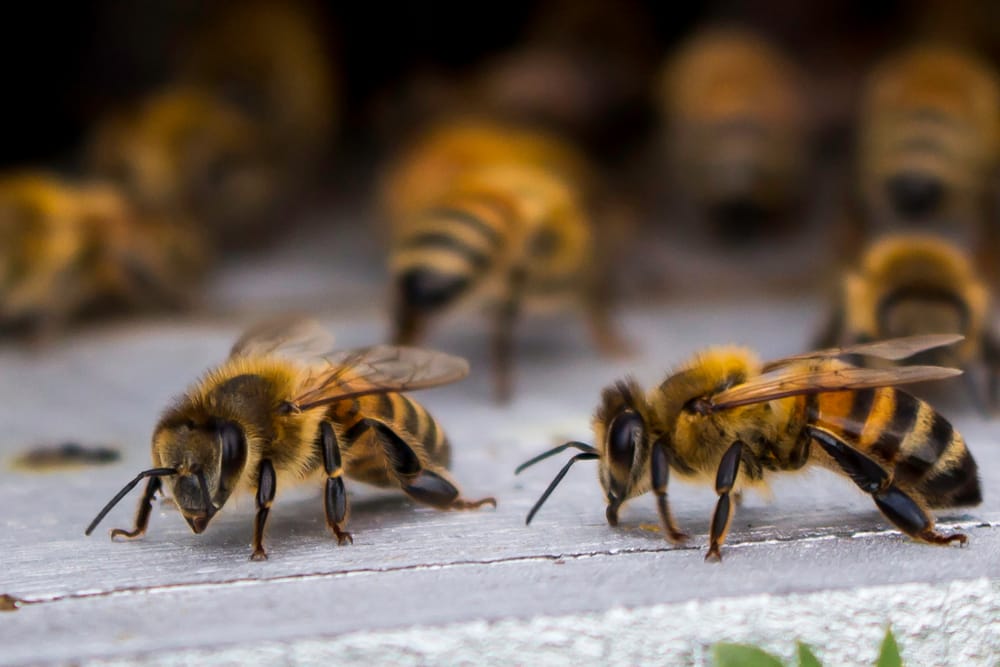
Identifying Characteristics and Facts
- Bees have three body parts, just like all other biting insects.
- The honey bee or Apis mellifera are light to dark brown in color.
- They also have bands of dark hairs in their abdomens and hair eyes.
- The head is heart-shaped with their abdomens are barrel-shaped.
Is Honey Bee Stings Dangerous?
Honey bee or Apis mellifera venom is not dangerous or toxic. They can only cause some swellings and pain that can only last for a few hours.
However, if you get stung by numerous bees or are allergic then you should seek medical attention.
Multiple bee stings have the ability to cause some systemic toxic reactions with severe symptoms that could include vomiting, diarrhea, hyperthermia, difficulty in breathing, and agitation among other symptoms.
When it comes to their importance, they add so much value to crops through pollination – far much more value than the value of honey. And not only this, but when present gardens, fruit trees, and farms thrive.
#6. Beetles

Beetles are another common insect in North Dakota. There are different species of beetles that are found in North Dakota. The most common is the Ant-like Longhorn beetle – Cryptophorus verrucosus.
They are called ant-like beetles because they resemble ants in every way – the way they run and even their looks. Their only difference lies in their ability to fly.
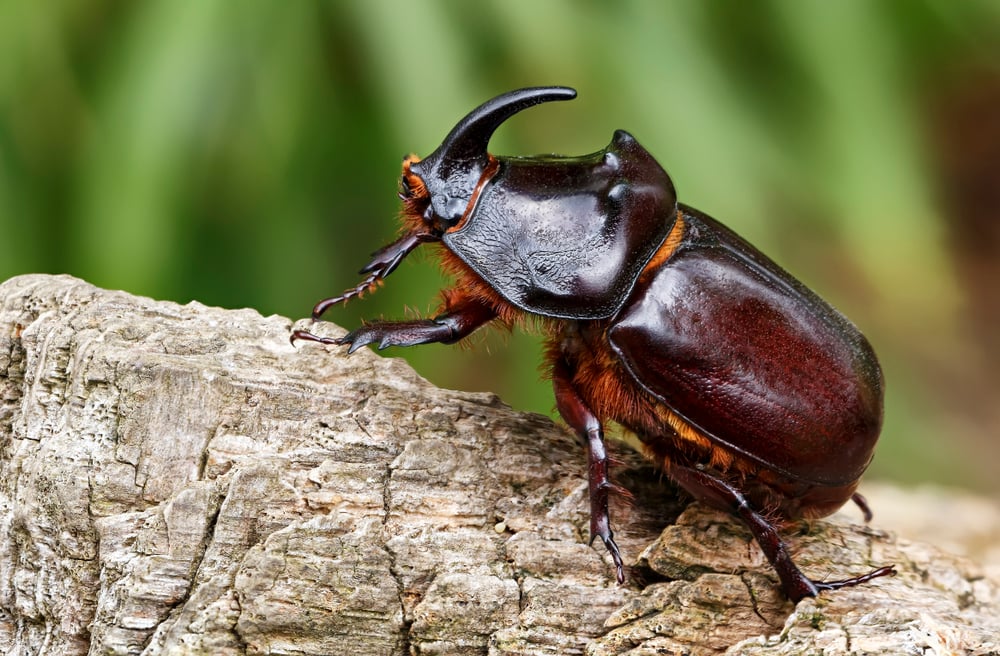
Identifying Characteristics and Facts
- Can walk over flowers like ants, have wings, and can fly, and are red or black in color and with a white pattern on the covering of their wings.
- Their larvae feed on dead trees or wood.
- They have big wide heads and shoulder bumps.
- They are mostly found in woody plants including shrubs and deciduous trees.
Are These Beetles Harmful?
The Ant-like Longhorn beetles (Cryptophorus verrucosus) are not dangerous to humans since they do not bite.
They are just pests where the larvae feed on dead trees or wood while the adult feeds on twigs and small branches but can also destroy large trees since they can bore holes in them.
#7. Black Ants

These ants (Monomorium minimum) are common around homes in North Dakota. You are likely to spot them in almost every household or building.
In the summer, you can find black ants in the grass, driveways, by trees, and almost anywhere else on your property and even in your garden. Black ants are by far one of the most common biting insects in North Dakota!
Identifying Characteristics and Facts
- They are shiny black, slender, and about 1/8-inches long.
- 12-segmented antennae.
- They are mostly found in masonry, woodwork, or rotten wood in homes.
- Feed on a variety of foods such as vegetables, meat, sweets, and even on other biting insects.
Are Little Black Ants Dangerous?
Their tiny nature and small mandibles make them less harmful or dangerous since you may not feel their sting or bite. They are, however, nuisance pests that can invade food items in your home.
It should be certain types of ants though can be destructive to wood, your garden, and even your house and property.
When they breed, they do multiply in thousands and may even become difficult to control. If this happens I recommend contacting an exterminator.
#8. Hover Fly
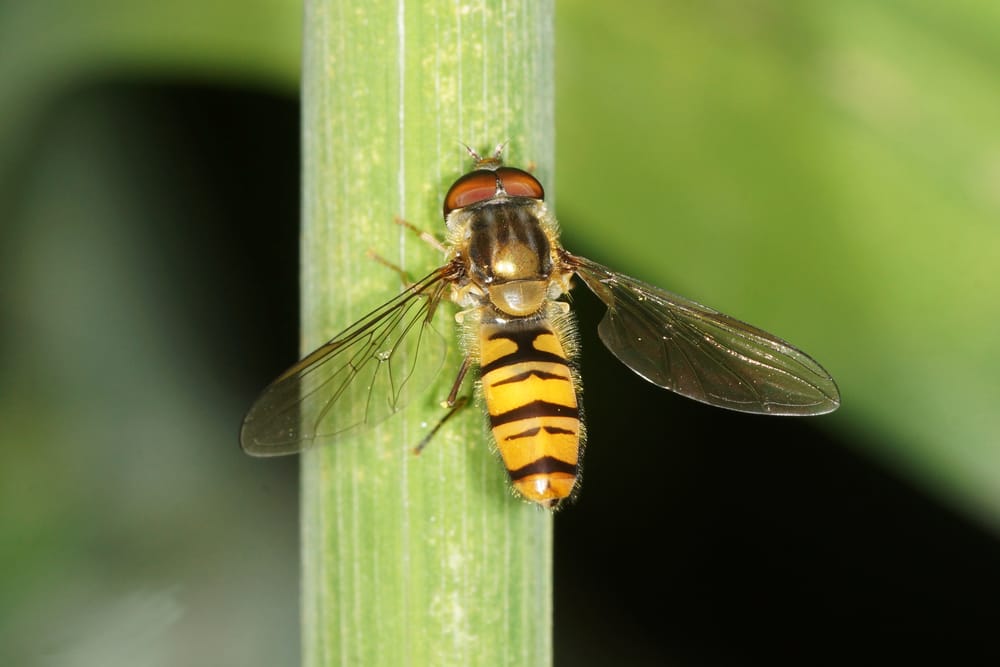
While you may not recognize them with the naked eye, you’ll hear hover flies and notice they are one of the most common biting insects in North Dakota. The most common Hoverflies in North Dakota are the Episyrphus balteatus.
It is important to note that hoverflies can live in different habitats. From homesteads to forests, you can find these flies.
When it comes to their feeding, the adults feed on nectar while the larvae feed on soft-bodies arthropods or aphids.
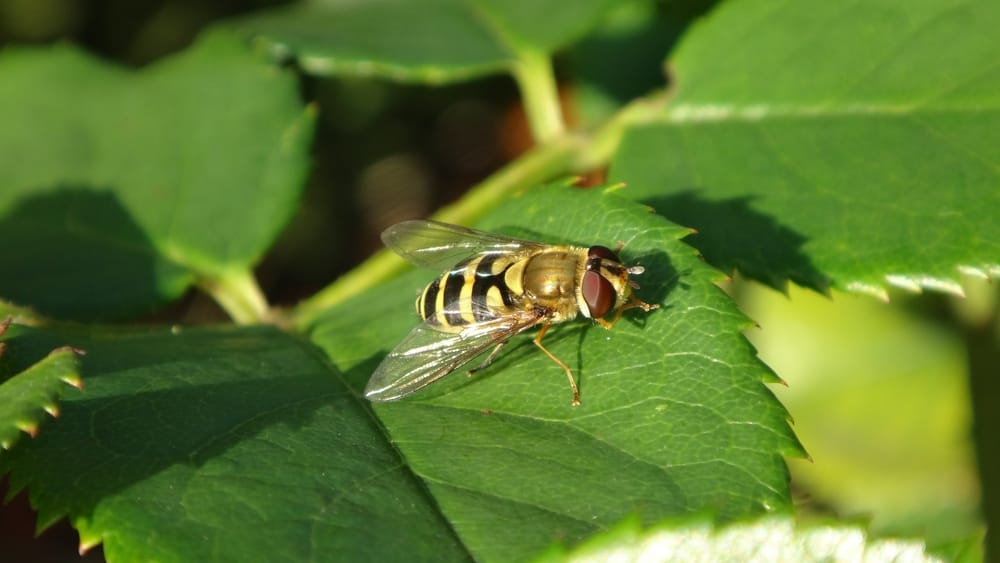
Identifying Characteristics and Facts
- Are about ¼ – 1 ¼ inches in size, yellow and black patterned color, orange, red, or brown markings.
- Has one pair of wings, has large eyes in relation to their head size.
- Their wings hover or vibrate many times when they fly.
- They can hang on one spot in mid-air for a short while.
- Can fly at high speeds of up to 40km/hour.
Are Hover Flies Dangerous?
Hoverflies cannot sting or bite hence are not dangerous. There is, however, the fear that many people have that they are likely to sting, given their vibrating sound while they fly.
Actually, they are beneficial since they can help, just like bees in promoting pollination in plants. The other benefit is that they also feed on aphids that are destructive pests hence adding more to their benefits in agriculture.
#9. Fruit Fly
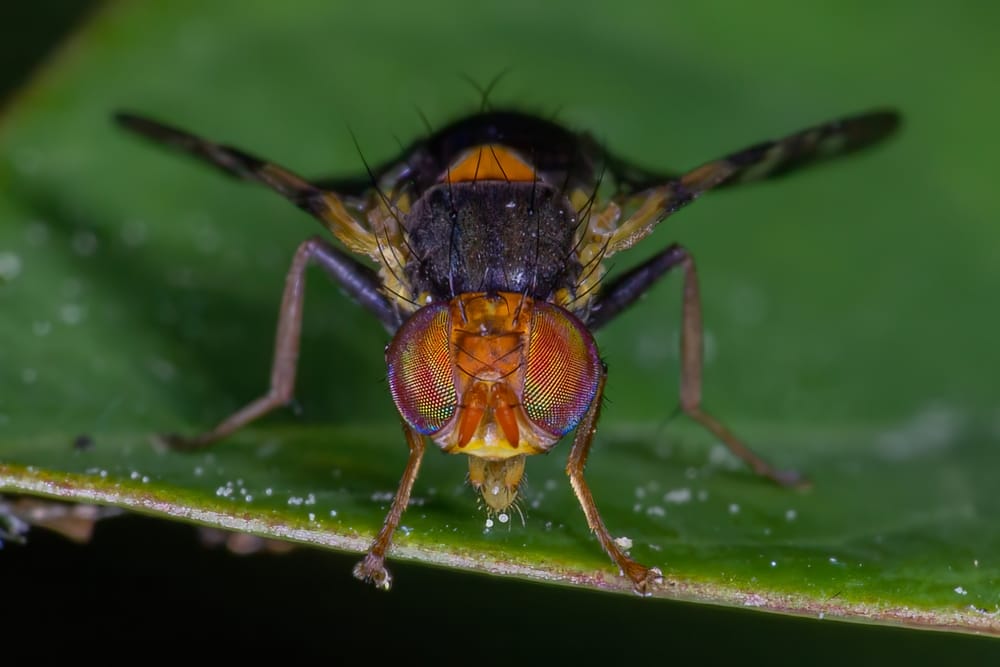
The fruit fly, also known as Drosophila melanogaster is referred to as a summer pest since they are common in late summer through fall.
You will spot them in restaurants, homes, or any place with ripened fruits or fermenting vegetables. They are incredibly common in North Dakota!
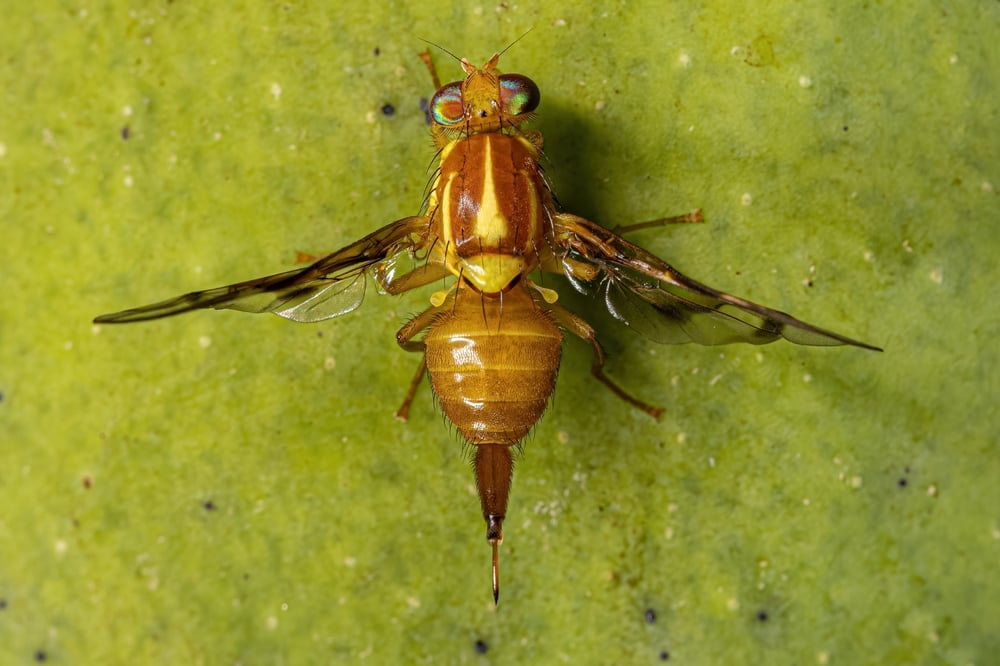
Identifying Characteristics and Facts
- Black abdomen and tan thorax, belly is gray and with red eyes.
- They grow to 1/8th inches in size.
- They lay eggs in moist organic materials or on the surface of fermenting good.
Are Fruit Flies Dangerous?
Fruit flies have the potential to contaminate food. They carry harmful bacteria such as E. coli and Salmonella that can cause food poisoning.
If you want to prevent them, then you need to get rid of things that could attract them, and fit windows and doors mesh screens that would not allow adult fruit flies to get into among other prevention methods.
#10. Fleas

Did you know that flea species are over 2000 in number? You are bound to run across one of these common biting insects in North Dakota!
However, the most common fleas in homes in North Dakota are the cat fleas – Ctnocephalides felis.
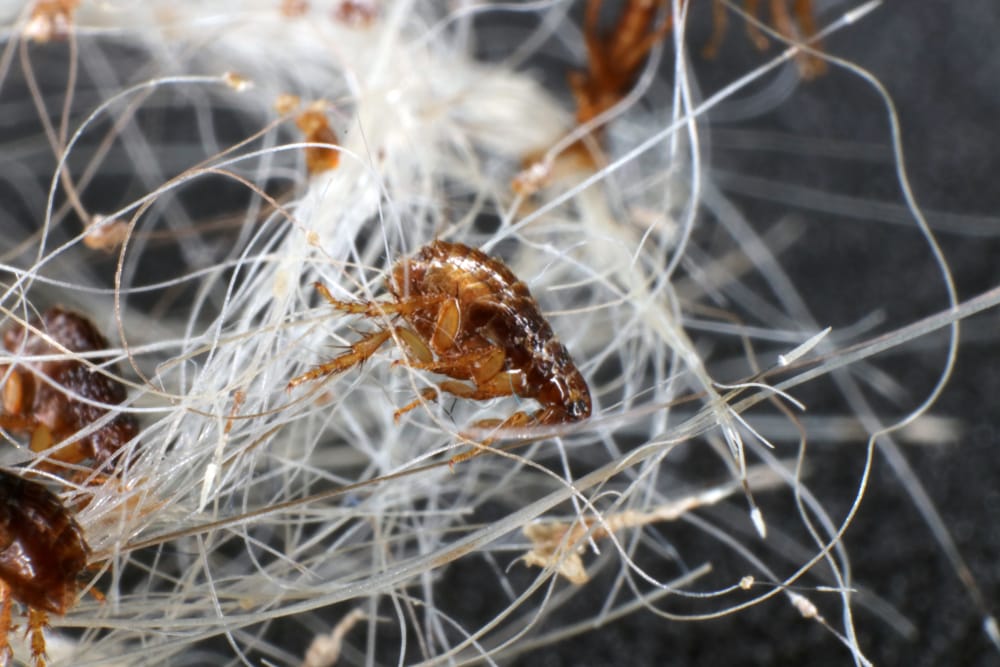
Identifying Characteristics and Facts
- They have reddish brown hard bodies, long and powerful back legs, and can jump.
- Feed on blood of all warm-blooded animals., and can feed on people when their preferred hosts are not there.
- Are small in size and even difficult to notice – about1/8th inches long.
Are Fleas Dangerous?
All fleas including dog, cat, and rabbit fleas among others have similar characteristics and their bites are itchy, irritating, and uncomfortable. They also carry some pathogens that can cause diseases when they bite.
You, therefore, need the best control measures and the right pesticides to get rid of these fleas and prevent further multiplication.
Common Factors of the Most Common Biting Insects in North Dakota
As a reminder, the below factors are common for the most common biting insects:
- Most can be found in your house, garden, and yard
- Most are not incredibly harmful to humans and pets but can cause irritation
- There are easy ways to both attract and deter the most common biting insects in North Dakota
- Most of these biting insects fly
And remember that you should pay attention to this guide, other local experts, and your local gardening clubs when identifying common biting insects.
If you want to learn about chickens, vegetables, fruits, herbs, and bees check out thegardeningdad and search for the plant you want to grow in the upper right-hand corner.


